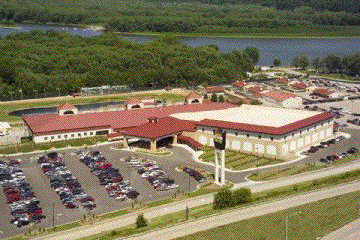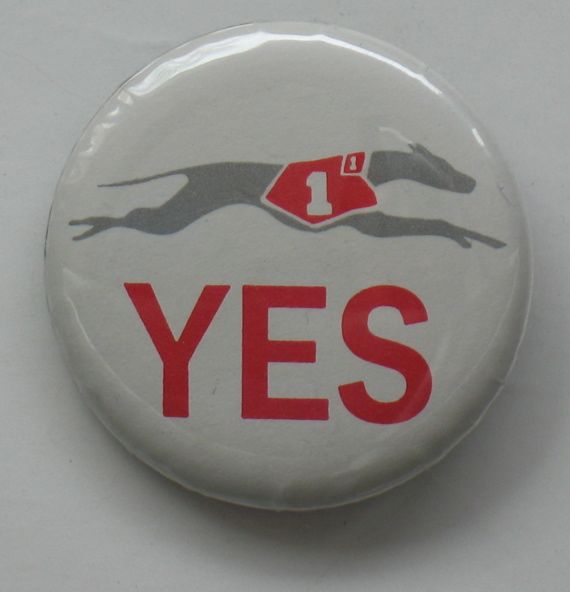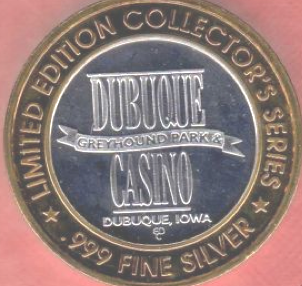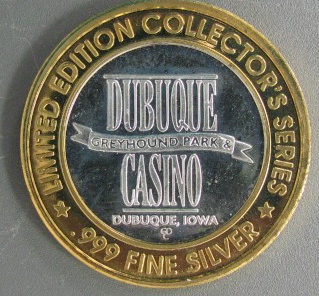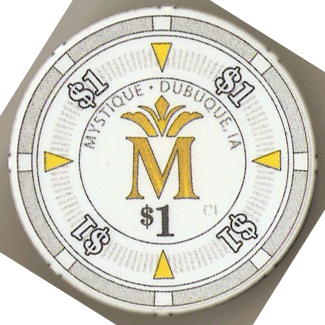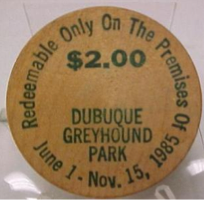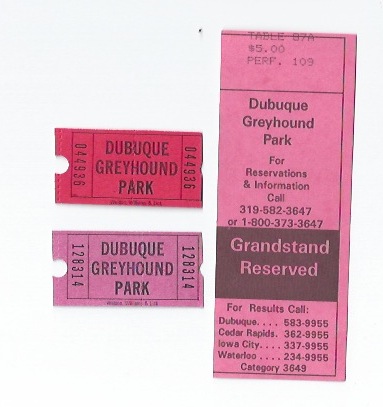Encyclopedia Dubuque
"Encyclopedia Dubuque is the online authority for all things Dubuque, written by the people who know the city best.”
Marshall Cohen—researcher and producer, CNN
Affiliated with the Local History Network of the State Historical Society of Iowa, and the Iowa Museum Association.
DUBUQUE GREYHOUND PARK AND CASINO: Difference between revisions
No edit summary |
No edit summary |
||
| Line 13: | Line 13: | ||
[[Image:round.png|left|thumb|150px|Collector's round.]]Surpassing Job Service of Iowa estimates of 4,000, a total of 5,750 people applied for three hundred track jobs in April 1985. The first greyhounds began training at the facility on May 7. Dubuque Greyhound Park's first contributions to the City of Dubuque and tri-state charities totaled $600,000 of which the city's share was $450,000. | [[Image:round.png|left|thumb|150px|Collector's round.]]Surpassing Job Service of Iowa estimates of 4,000, a total of 5,750 people applied for three hundred track jobs in April 1985. The first greyhounds began training at the facility on May 7. Dubuque Greyhound Park's first contributions to the City of Dubuque and tri-state charities totaled $600,000 of which the city's share was $450,000. | ||
Despite the poor performance and then closing of three of Iowa's riverboats in 1992, legislation to relax gambling regulation repeatedly failed. Riverboat gambling according to many had been successful in promoting tourism and was never intended to become an industry. Despite setbacks, pressure continued from riverboat owners to lift betting/loss limits and space restrictions. These people were joined by parimutuel racetrack owners who wanted slot machines and even Iowans who favored less restriction. Concerns about the effects of gambling eventually led the Iowa House to only approve the new legislation by a 51-49 vote. Before gambling laws could be eased, local approval was required in counties where riverboats and racetracks were operated. This occurred in May 1994. | |||
Racetracks benefited from the new legislation. Racetracks were permitted to have slot machines and operate 24 hours daily. Slot machines quickly subsidized the racing. In 1996 the total parimutuel revenue at Iowa three tracks was $18.8 million. Slot machine revenue, however, for the same period was $257.6 million. | |||
In the first year, [[DUBUQUE GREYHOUND PARK AND CASINO]] slot machine revenue far exceeded projections. In 1996, the machines brought in over $20 million in adjusted gross receipts (the amount wagered minus winnings paid) well above the estimated earnings of $12 million. The state received close to $3.5 million in gaming and admission taxes with the City of Dubuque and Dubuque County each receiving more than $100,000 in taxes. | In the first year, [[DUBUQUE GREYHOUND PARK AND CASINO]] slot machine revenue far exceeded projections. In 1996, the machines brought in over $20 million in adjusted gross receipts (the amount wagered minus winnings paid) well above the estimated earnings of $12 million. The state received close to $3.5 million in gaming and admission taxes with the City of Dubuque and Dubuque County each receiving more than $100,000 in taxes. | ||
Revision as of 16:15, 12 January 2012
DUBUQUE GREYHOUND PARK AND CASINO. Iowa's first greyhound racing track. On April 24, 1984, Dubuque voters overwhelmingly approved a $6.5 million bond referendum for the construction of a greyhound-racing track. With 60 percent needed for passage, the measure received a stunning 71 percent approval with 11,959 voting for and 4,992 opposed to the project. The referendum was the largest in Dubuque history.
Following the successful vote, track officials were faced with filing the application for Dubuque's racing license. Hundreds of pages long and over one-inch thick, the document was hand delivered by Terry HARRMANN and Arnold N. HONKAMP to the offices of the Iowa Racing Commission in Des Moines to meet the June 1 deadline.
The Commission spent six weeks studying eastern Iowa applications from Cedar Rapids (which also sought a horse-racing license), Dubuque, and Waterloo. The announcement that Dubuque would receive the first license came on July 18, 1984. One week later the Commission awarded Dubuque the lucrative summer racing schedule.
With a target opening date of June 1, 1985, the first construction contract was awarded by the City Council on July 30, 1984. Two weeks later the Council received the shocking news that construction costs had soared from $8 million to $10.1 million resulting in the City needing to borrow an additional $1.4 million in bonds.
Construction began on August 24 with a dredge pumping sand on to CHAPLAIN SCHMITT ISLAND. Construction problems included scheduling steel shipments during the fall and high winds that slowed roof construction during the winter.
During the fall of 1984, the Dubuque Racing Association named the Dubuque track and hired Roy Berger as general manager. Berger, then the general manager of a track in Tucson, Arizona, was the youngest dog track manager in the United States.
Surpassing Job Service of Iowa estimates of 4,000, a total of 5,750 people applied for three hundred track jobs in April 1985. The first greyhounds began training at the facility on May 7. Dubuque Greyhound Park's first contributions to the City of Dubuque and tri-state charities totaled $600,000 of which the city's share was $450,000.
Despite the poor performance and then closing of three of Iowa's riverboats in 1992, legislation to relax gambling regulation repeatedly failed. Riverboat gambling according to many had been successful in promoting tourism and was never intended to become an industry. Despite setbacks, pressure continued from riverboat owners to lift betting/loss limits and space restrictions. These people were joined by parimutuel racetrack owners who wanted slot machines and even Iowans who favored less restriction. Concerns about the effects of gambling eventually led the Iowa House to only approve the new legislation by a 51-49 vote. Before gambling laws could be eased, local approval was required in counties where riverboats and racetracks were operated. This occurred in May 1994.
Racetracks benefited from the new legislation. Racetracks were permitted to have slot machines and operate 24 hours daily. Slot machines quickly subsidized the racing. In 1996 the total parimutuel revenue at Iowa three tracks was $18.8 million. Slot machine revenue, however, for the same period was $257.6 million.
In the first year, DUBUQUE GREYHOUND PARK AND CASINO slot machine revenue far exceeded projections. In 1996, the machines brought in over $20 million in adjusted gross receipts (the amount wagered minus winnings paid) well above the estimated earnings of $12 million. The state received close to $3.5 million in gaming and admission taxes with the City of Dubuque and Dubuque County each receiving more than $100,000 in taxes.
The City of Dubuque also received an estimated $1.5 million in lease payments from the racing association, equal to one-half percent of the coins put into the machines. These figures did not include the distribution the racing association made at the end of its fiscal year. The distribution, from excess revenue, was divided with half going to the city, one-quarter to charity, and one-quarter to a racing association reserve fund.
During the 1996 racing reason, employment reached an estimated 340 people with a $4.4 million payroll. The casino generated over $1 million in pursue money for greyhounds.
In February 2009. Dubuque Greyhound Park and Casino announced that it would be changing its name to Mystique. The change in name was part of a $10 million overhaul to help the facility compete with the larger DIAMOND JO CASINO. Mystique would offer 1,000 slots, 18 tables, a poker room and dog track. New offerings included Champagne, a new steak house; Bon Appetit, a buffet; Encore, a stage for live entertainment; The Cabaret at Mystique, an entertainment venue; and the Rendezvous Bar.


